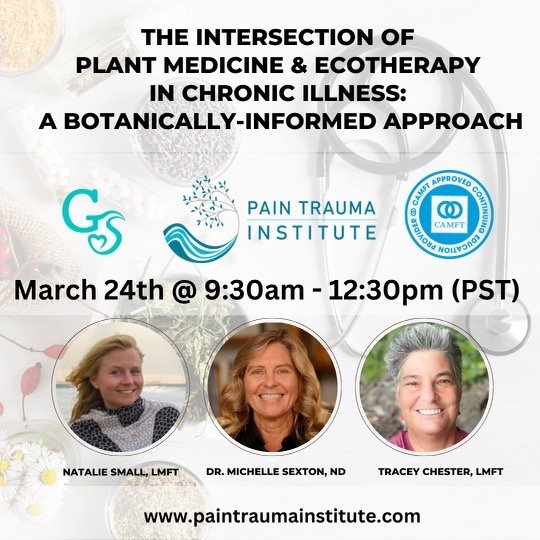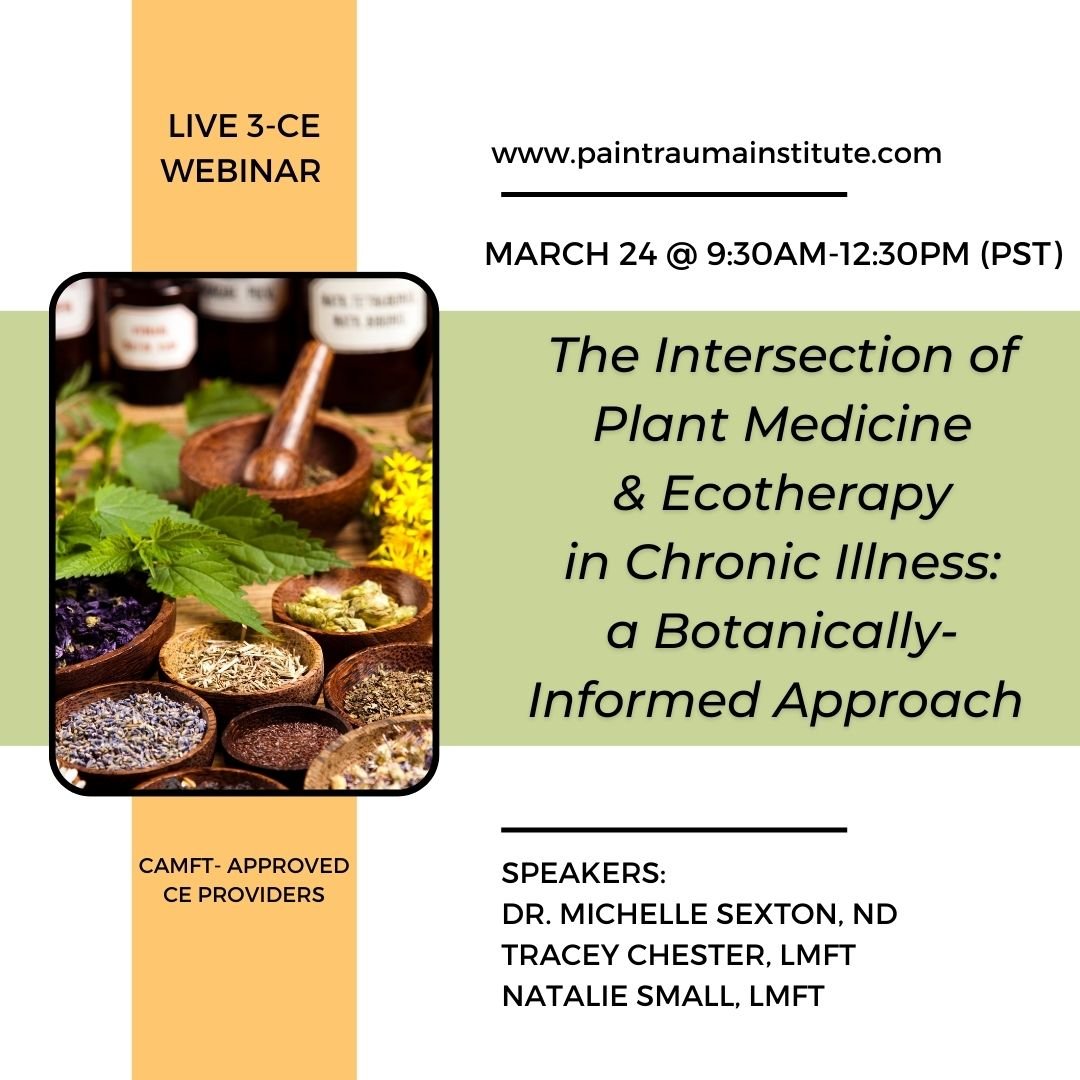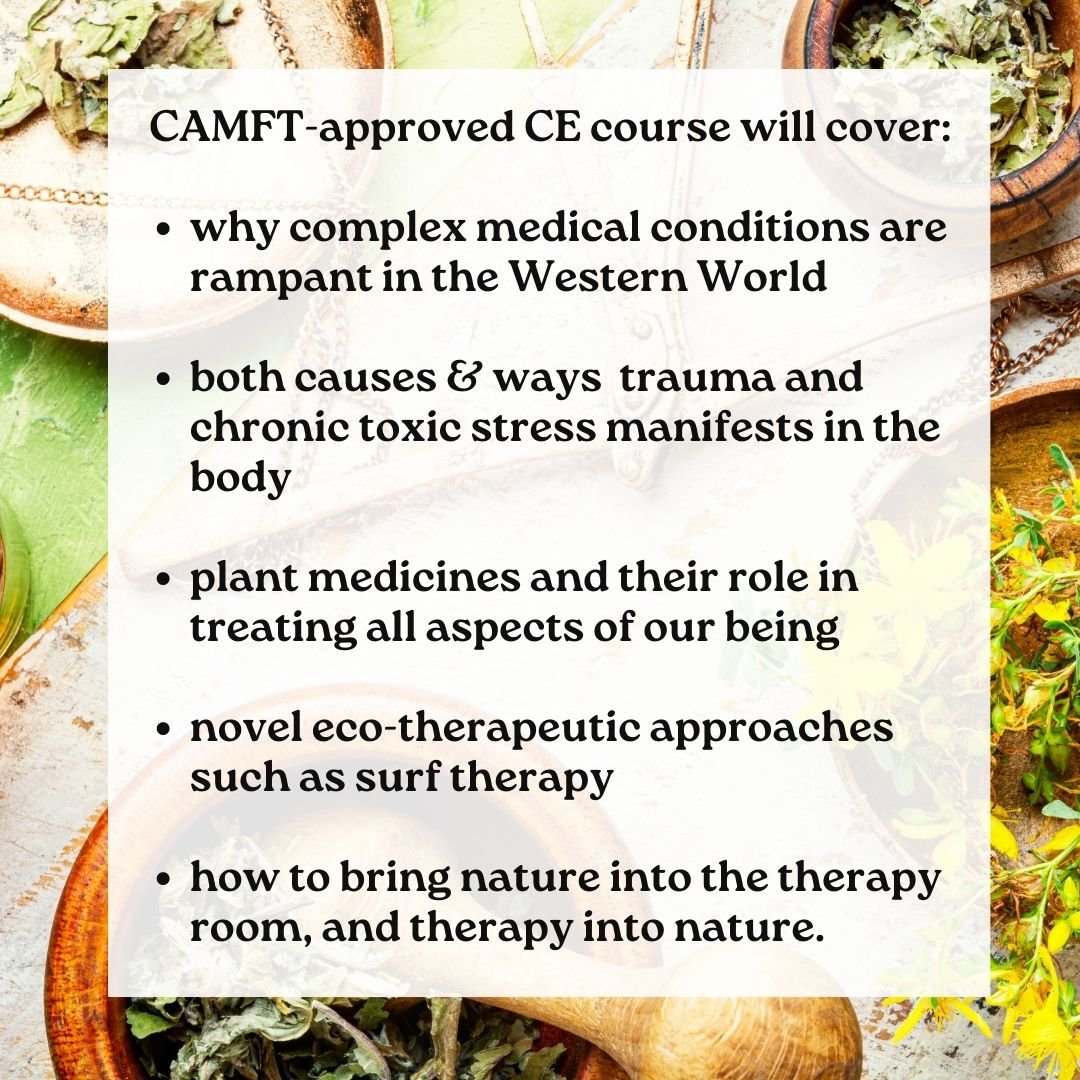Recording of our Live 3-hr Webinar! Friday, March 24th 9:30am-12:30 PST. CAMFT approved! The Intersection of Plant Medicine and Ecotherapy in Chronic Illness: a Botanically-Informed Approach
Did you miss the live event? You can still earn your CEU credits virtually.
Connection with nature has been considered beneficial for psychological and physical well-being since times of evolution. Our ancestors and indigenous cultures centered on the fact that man and nature are not radically different entities. Furthermore, the value of community has eroded in modern life especially in Western Societies. This has led to an epidemic of isolation and loneliness, which contributes to poor health outcomes. .
Both the Agricultural revolution and the Industrial Age have led to the relatively lightning speed of globalization, overpopulation, urbanization and technological advancement. . In addition to playing a huge role in high rates of disease, It has also led to restricted access to nature. We are simply not evolved physically or emotionally to live in this fast pace, where daily stressors assault us. Being in nature allows us to connect with our origins, and has neurobiological benefits.
Eco-therapy is the practice of utilizing nature as a primary therapeutic source. Interaction occurs with wild or semi-natural areas of nature, and further enhances through sensory contact, mindfulness and play. Eco-therapy has been shown to be effective in treating medical disorders like hypertension, obesity, post-surgical recovery, depression, PTSD and other stress related disorders.
In this course, you will learn why complex medical conditions are rampant in the Western World. We will address why trauma and chronic toxic stress cause disease, emotional and physical and the way it manifests in the body. You will learn about the role of plant medicine as a form of eco- therapy, as well as novel eco-therapeutic approaches such as surf therapy. We will explore how to bring nature into the therapy room, and therapy into nature.
Did you miss the live event? You can still earn your CEU credits virtually.
Connection with nature has been considered beneficial for psychological and physical well-being since times of evolution. Our ancestors and indigenous cultures centered on the fact that man and nature are not radically different entities. Furthermore, the value of community has eroded in modern life especially in Western Societies. This has led to an epidemic of isolation and loneliness, which contributes to poor health outcomes. .
Both the Agricultural revolution and the Industrial Age have led to the relatively lightning speed of globalization, overpopulation, urbanization and technological advancement. . In addition to playing a huge role in high rates of disease, It has also led to restricted access to nature. We are simply not evolved physically or emotionally to live in this fast pace, where daily stressors assault us. Being in nature allows us to connect with our origins, and has neurobiological benefits.
Eco-therapy is the practice of utilizing nature as a primary therapeutic source. Interaction occurs with wild or semi-natural areas of nature, and further enhances through sensory contact, mindfulness and play. Eco-therapy has been shown to be effective in treating medical disorders like hypertension, obesity, post-surgical recovery, depression, PTSD and other stress related disorders.
In this course, you will learn why complex medical conditions are rampant in the Western World. We will address why trauma and chronic toxic stress cause disease, emotional and physical and the way it manifests in the body. You will learn about the role of plant medicine as a form of eco- therapy, as well as novel eco-therapeutic approaches such as surf therapy. We will explore how to bring nature into the therapy room, and therapy into nature.
Did you miss the live event? You can still earn your CEU credits virtually.
Connection with nature has been considered beneficial for psychological and physical well-being since times of evolution. Our ancestors and indigenous cultures centered on the fact that man and nature are not radically different entities. Furthermore, the value of community has eroded in modern life especially in Western Societies. This has led to an epidemic of isolation and loneliness, which contributes to poor health outcomes. .
Both the Agricultural revolution and the Industrial Age have led to the relatively lightning speed of globalization, overpopulation, urbanization and technological advancement. . In addition to playing a huge role in high rates of disease, It has also led to restricted access to nature. We are simply not evolved physically or emotionally to live in this fast pace, where daily stressors assault us. Being in nature allows us to connect with our origins, and has neurobiological benefits.
Eco-therapy is the practice of utilizing nature as a primary therapeutic source. Interaction occurs with wild or semi-natural areas of nature, and further enhances through sensory contact, mindfulness and play. Eco-therapy has been shown to be effective in treating medical disorders like hypertension, obesity, post-surgical recovery, depression, PTSD and other stress related disorders.
In this course, you will learn why complex medical conditions are rampant in the Western World. We will address why trauma and chronic toxic stress cause disease, emotional and physical and the way it manifests in the body. You will learn about the role of plant medicine as a form of eco- therapy, as well as novel eco-therapeutic approaches such as surf therapy. We will explore how to bring nature into the therapy room, and therapy into nature.



